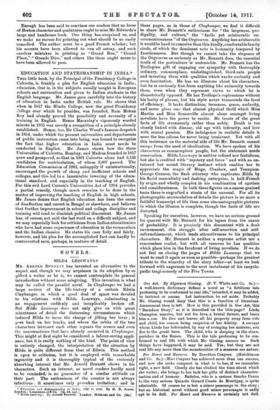EDUCATION AND STATESMANSHIP IN INDIA.* THIS little book, by the
Principal of the Presidency College in Calcutta, is frankly a plea for English education in India; education, that is, in the subjects usually taught in European schools and universities and given to Indian students in the English language. Mr. James goes carefully into the history of education in India under British rule. He shows that when in 1817 the Hindu College, now the great Presidency College over which he presides, was founded, Ram Mohan Roy had already proved the possibility and necessity of a training in English. Hence Macaulay's vigorously worded minute in 1835 was merely a recognition of a principle already established. Hence, too, Sir Charles Wood's famous despatch in 1854, under which the present universities and departments of public instruction came into being, was bound to recognize the fact that higher education in India must needs be conducted in English. Mr. James shows how the three Universities of Calcutta, Bombay. and Madras founded in 1857 grew and prospered, so that in 1901 Calcutta alone had 6,135 candidates for matriculation, of whom 3,307 passed. The Education Commission of 1882, unhappily if unintentionally, encouraged the growth of cheap and inefficient schools and colleges, and this led to a lamentable lowering of the educa- tional standard, and especially in the teaching of English. For this evil Lord Curzon's Universities Act of 1904 provides a partial remedy, though much remains to be done in the matter of improving the teaching of English in high schools, Mr. James denies that English education has been the cause of disaffection and unrest in Bengal or elsewhere, and believes that further improvement in school and college discipline and training will tend to diminish political discontent. Mr. James has, of course, not said the last word on a difficult subject, and we may especially look for criticisms from Indian educationists who have had some experience of education in the vernaculars and the Indian classics. He states his case fully and fairly, however, and his plea for the accomplished fact can hardly be controverted save, perhaps, in matters of detail.


















































 Previous page
Previous page